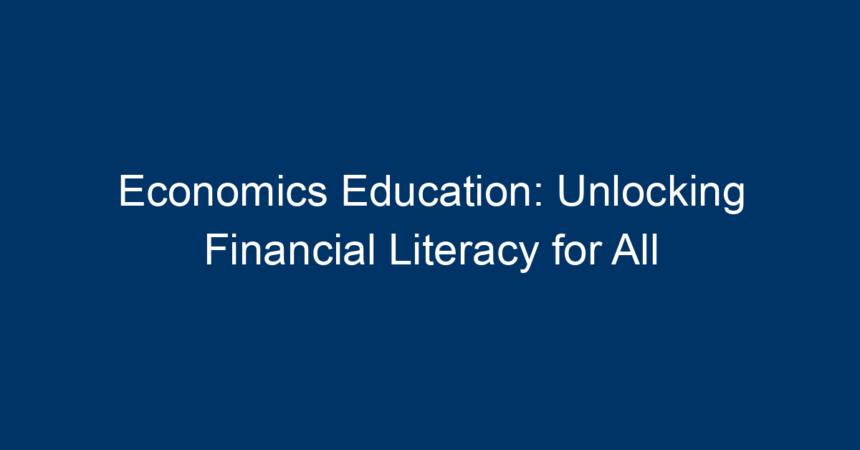In today’s fast-paced world, economic decisions play a pivotal role in our everyday lives. From personal finance to global markets, understanding economics is crucial. This necessity brings us to a vital component of modern education: economics education. A strong foundation in this subject does not only equip individuals with essential skills for personal financial management but also cultivates informed citizens who can navigate the complexities of today’s economy.
The Importance of Economics Education
Understanding Financial Literacy
Financial literacy, the ability to understand and effectively use various financial skills, is becomes increasingly important. Without critical knowledge in economic principles, many people find themselves struggling with issues like budgeting, investing, and saving.
Economics education lays the groundwork for financial literacy, teaching individuals how to make informed choices about money management. By understanding concepts such as interest rates, inflation, and market dynamics, learners can apply this knowledge to their daily lives, significantly improving their financial wellbeing.
Bridging the Gap
Many educational systems still overlook the importance of economics education, leaving students without essential knowledge that could serve them for a lifetime. Economically disadvantaged communities suffer the most from this gap. Without proper financial education, individuals are far more likely to remain in cycles of poverty.
Economics education can bridge this gap, empowering people with the knowledge needed to make better financial decisions. It can serve as a powerful tool for social mobility, allowing individuals from all backgrounds to understand and capitalize on economic opportunities.
Fundamental Concepts of Economics Education
Microeconomics vs. Macroeconomics
Microeconomics focuses on individual choices and behaviors, analyzing how personal decisions impact supply and demand. Concepts such as opportunity cost and elasticity can help individuals make wise consumption choices.
Macroeconomics, on the other hand, addresses the economy as a whole, including national income, inflation, and unemployment rates. Understanding macroeconomic principles enables individuals to grasp how broader economic factors can affect their lives and careers.
The Role of Incentives
In economics education, incentives are often explored as a driving force behind decision-making. By understanding how incentives work, students can better interpret human behavior in financial contexts. This understanding extends beyond individual choices to encompass societal norms and market trends.
The Importance of Markets
Markets operate on the principles of supply and demand. An understanding of market dynamics is essential for anyone wishing to navigate the complexities of economic transactions. Economics education fosters an appreciation for how markets function and emphasizes the significance of competition and regulation.
Integrating Economics Education into School Curricula
Early Education: Starting Young
Introducing economics at an early age can set the foundation for lifelong financial literacy. Schools should consider integrating financial education into the curriculum from grade school, using engaging methods tailored to younger audiences. Through games, simulations, and interactive lessons, students can grasp basic economic principles in a fun and exciting manner.
High School: Preparing for the Future
In high school, students should dive deeper into both micro and macroeconomic concepts. A dedicated course in economics could include topics such as budgeting, investing, credit management, and understanding credit scores.
Hands-on projects, such as running a mock business, can provide real-world experiences that reinforce theoretical knowledge. High school students assuage their anxiety about entering adulthood by equipping themselves with vital skills for their financial futures.
Adult Education: Lifelong Learning
Economics education does not stop after graduation. Many adults can benefit from workshops and community classes focused on financial literacy. Local governments, nonprofits, and even private businesses can play a role by offering resources and training.
Topics like retirement planning, tax strategies, and investment options are particularly beneficial for adults. Programs aimed at helping underprivileged sections of society to improve their financial knowledge are essential to fostering economic growth throughout communities.
Digital Revolution: Leveraging Technology for Economics Education
Online Resources and Platforms
The digital age has opened new avenues for economics education. A multitude of online courses, webinars, and videos are available to anyone interested in enhancing their financial literacy. Platforms like Khan Academy, Coursera, and edX offer courses that cover various aspects of economics, making this education more accessible than ever before.
Mobile Applications: Learning on the Go
Smartphones serve as powerful tools for education. Mobile applications focused on personal finance management can complement formal education by teaching users budgeting techniques, investment strategies, and saving methods. Applications like Mint and Acorns offer intuitive interfaces to track spending and savings goals, thus enhancing the practical application of economics education.
Real-World Applications of Economics Education
Personal Finance Management
Knowledge gained through economics education empowers individuals to manage their finances effectively. Understanding how to budget, save, and invest gives people the tools to navigate financial uncertainty and attain their financial goals.
Business and Employment Opportunities
For aspiring entrepreneurs, economics education is invaluable. It equips individuals with skills necessary to understand market trends, assess risks, and capitalize on economic opportunities. Likewise, for employees, comprehension of economic concepts helps in career advancement, making informed contributions to organizational strategies.
Challenges in Implementing Economics Education
While the benefits of economics education are clear, several challenges exist in implementation. Budget constraints, lack of qualified educators, and varying educational standards across states can impede efforts to integrate economics education into mainstream curricula.
Additionally, the challenge lies in making this education appealing and relatable to students, many of whom may find economics abstract or boring. Innovative teaching methods are necessary to engage learners effectively.
Conclusion: Taking Action for a Financially Literate Future
The path to a financially literate society begins with robust economics education at all levels. By prioritizing this education, we can empower individuals and communities to make informed financial decisions, fostering economic growth and stability.
Actionable Insights
-
Advocate for Curriculum Changes: Support the inclusion of economics education in your local schools. Attend school board meetings and collaborate with teachers to push for necessary changes.
-
Utilize Online Resources: Explore online courses and platforms that offer valuable economics education tailored to your needs. Don’t hesitate to invest in yourself through education.
- Participate in Community Workshops: Engage with your local community and seek workshops designed to enhance financial literacy. Learn from experts and apply this knowledge in everyday life.
In summary, economics education is not merely a subject; it is a tool for empowerment, equity, and progress. The journey to financial literacy and informed economic participation begins today!




